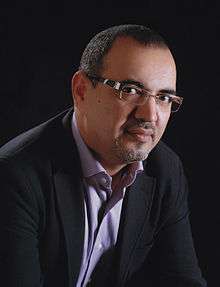Emad Hajjaj
Emad Hajjaj (Arabic: عماد حجاج) is a Palestinian-Jordanian editorial cartoonist.[1][2][3] He is best known for his work in Al Rai and the Jordan Times daily newspapers.[4]
Emad Hajjaj | |
|---|---|
 | |
| Born | 1967 (age 52–53) West Bank, Jordan |
| Nationality | Jordanian |
| Education | Bachelor of Fine Arts, Yarmouk University |
| Known for | drawing caricatures |
| Website | www |
Life and career
Emad was born in Jordan's West Bank in 1967.[5] He received his art education at Yarmouk University graduating with a Bachelor of Arts in 1991 after majoring in graphic design and with a minor in journalism.<ref>"Emad Hajjaj," [Biogrraphical Notes], Cartooning for Peace, Online:</ref> Emad is the brother of Osama Hajjaj who is also a cartoonist and political caricaturist.[6] The brothers are actually aware of the challenges involved in publishing political cartoons in strife-torn Middle East. Both have been victims of intimidation and have received death threats on account of their satirical work, especially for cartoons directed at ISIS.[7]
During the Pan Arab games held in Amman, Emad published a cartoon which pointed out the irony that a nation could be proud when it allowed honor killings to continue.[4] In 2008, an exhibition of his work, featuring 100 drawings was held at the city hall of Ra's al-'Ayn,[8] and he was a contributor to the Lighting Lamps exhibition which was sponsored by the British Council.[9]
Abu Mahjoob

Hajjaj created the cartoon character Abu Mahjoob (Arabic: أبو محجوب) in 1993, and has gained in popularity in Jordan since then. Abu Mahjoob represents the common Jordanian man and portrays his every day political, social, and cultural concerns.[10] He wears a pinstripe suit and necktie along with a red keffiyeh and agal, and sports a crooked moustache.
Emad Hajjaj first drew Abu Mahjoob in 1993 as a character who hung candidate posters in the Jordanian parliamentary election that year. Hajjaj based the character on his father in terms of his witty and ironic humor.[11]
See also
References
- Kummer, Patricia K. (2006). Jordan (Enchantment of the World, Second). Children's Press. pp. 114. ISBN 978-0-516-24870-7.
- Suleiman, Yasir (2011). Arabic, Self and Identity: A Study in Conflict and Displacement. Oxford University Press. pp. 162. ISBN 978-0-19-974701-6.
- Mahafzah, Al (2008). Sarvepalli Gopa (ed.). History of humanity: scientific and cultural development. The twentieth century. p. 682. ISBN 978-92-3-104083-2.
- Warrick, Catherine (2009). Law in the service of legitimacy: gender and politics in Jordan. Ashgate. p. 77. ISBN 978-0-7546-7587-7.
- "Emad Hajjaj," [Biogrraphical Notes], Cartooning for Peace, Online:; Bendazz, G., Animation: A World History,' Vol. III, CRC Press, 2015, [E-text edition], n.p.
- Maktabi, R., "Brothers' political cartoons break taboos," CNN: Middle East News, 5 April 2011 Online:
- Gruber, C., "Fighting ISIS With A Pen," 26 June, Newsweek, 26 June 2015, Online:
- "Hajjaj cartoons to be on display". Jordan Times. 1 August 2008.
- Franks, Tim (16 March 2009). "Jerusalem Diary: 16 March". BBC.
- Tarawneh, Naseem (May 2010). "Hala 3ammi: The Abu Mahjoob Legacy" (PDF). Jordan Business: 55–57. Archived from the original (PDF) on 2017-10-27. Retrieved 2013-02-14. Cite journal requires
|journal=(help) - "مبدع شخصيّة "أبو محجوب" عماد حجاج -رسالته حياة النّاس وهمومهم" (in Arabic). Heya. July 2008. Archived from the original on 2014-12-06. Cite journal requires
|journal=(help)
Further reading
- Eisenberg, Laura Zittrain, Neil Caplan Negotiating Arab-Israeli peace: patterns, problems, possibilities Indiana University Press ISBN 978-0-253-22212-1 Has five images donated by Hajjaj.
- B'nai B'rith, Anti-Semitic, Anti-Israel Cartoons by Jordan-Based Palestinian Cartoonist. Retrieved 18 April 2012.